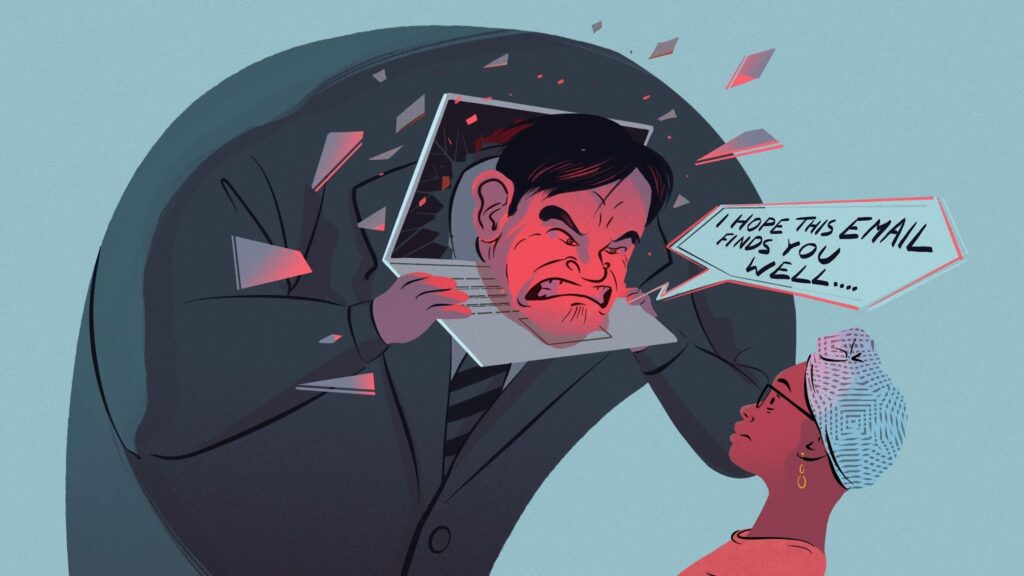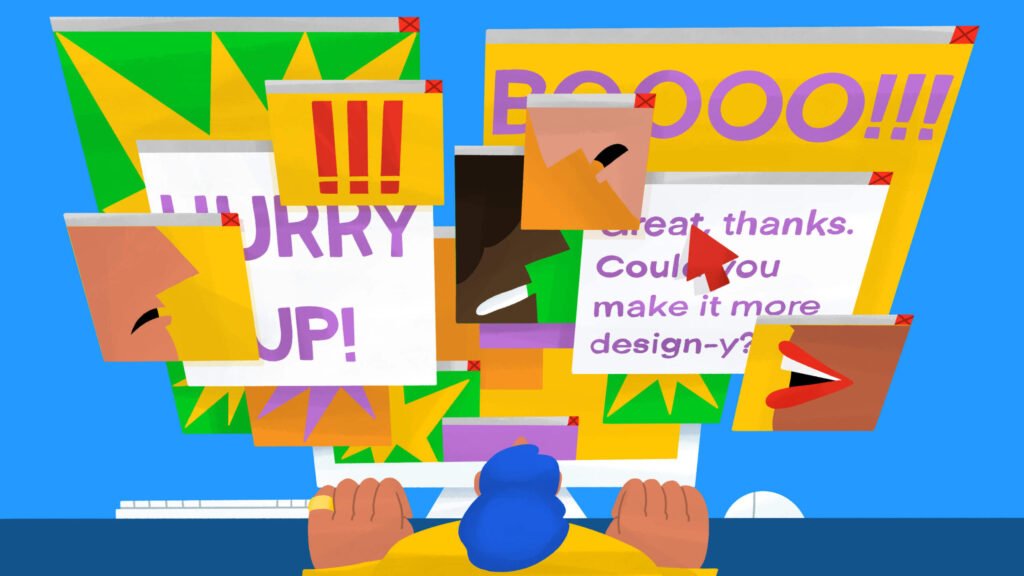Running your own business is scary enough, but there’s something about freelancing that can bring out the worst in people—from unpaid invoices to increased scope, and people who are just generally difficult to deal with. We asked our community to share with us their freelancing horror stories, and they definitely delivered. The bone-chilling stories told around campfires, at sleepovers and on school trips that used to give us nightmares—they’ve got nothing on these toxic tales of freelancing gone wrong.
“No one else at the company knew I existed. I was a ghost.”
Several years go, Mindy* (name and details changed to protect her identity) was contracted for 6 months to provide social media support for a large insurance company. It was her biggest client to date, and she was so excited to add the work to her portfolio. For two months, things were moving along swimmingly and her main contact at the company was responsive, pleased with her work, and paying her invoices on time.
But in the third month, Mindy says, “I sent the next month’s content over, along with my invoice, and there was no reply. Fine, he’s busy, or maybe on vacation. I waited maybe a week or 10 days before trying again.”
That follow up email bounced—Mindy received an automated reply telling her the recipient was not found. “I didn’t know anyone else at the company, I hadn’t dealt with anyone but him.” So she started calling the company’s main phone directory, trying to track down anyone in the marketing department. Finally, she got through.
The problem? No one had heard of her. No one had any idea she’d been working with the marketing manager, and to make matters worse, there was no record of her having been paid through normal payroll. “He had paid me with a card, which I’d assumed was his corporate card,” said Mindy. Card payments aren’t unusual, and most employees are authorized to charge up to a certain amount while larger fees typically process through corporate accounting.
Since there was no proof of her ever having worked with the company, Mindy provided email exchanges and original project files of the social media content she’d created, along with her original contract. It turns out that the marketing manager (now fired) had been subcontracting Mindy to outsource a part of his job—and paying her personally.
This horror story has a happy ending: Mindy’s work had been good enough to impress the marketing department, and she was ultimately offered the marketing manager’s job. “I don’t know what the real lesson is here,” she said. “Definitely try to meet other people at the company, and save the receipts, you never know when you might need them.”
“My friend stole my business.”
“Let me start by saying this sounds really petty,” said Cara* when explaining her horror story. Cara and her friend Stacy met in art school and were recent graduates, looking for work. A friend of Cara’s was getting married and asked Cara if she would be the photographer. Cara accepted and found that she “surprisingly enjoyed it! I was able to be creative but also make money which at the time was all I was focussed on.”
That one-off wedding turned into two, then four, and then Cara was running a successful solo wedding photography business. So successful, in fact, that she needed help. So she asked Stacy to join her as a partner, to share the work (and the profits). Stacy was reluctant to partner, but then eventually gave in. “She said she didn’t want to be a wedding photographer because she was an artist. She acted like the work was below her and that I was ‘betraying’ my creativity by doing basic work.”
The duo created a logo and a brand together and split the profits 50-50. “We booked a ton of artsy weddings and we were able to do some really creative work together. Plus, it was fun. We could hang out while we worked. It really didn’t feel like a job.” They upgraded their photography equipment and shared all the expenses. They got along great, but did often disagree on the aesthetic of their overall brand. “I wanted a light and airy vibe, she wanted more goth, but we met somewhere in the middle”
The trouble began when Cara was looking for an image file and spotted a couple from a wedding she didn’t recognize. “She was doing extra work and making extra money, using the equipment we bought together, and the portfolio we shared.” Cara confronted Stacy, who said the bride was just a close friend and it was a last minute wedding. Cara let it go, until she got a text from another art school friend.
“You’ve got to see this,” read the text, and there was a link to an Instagram account: Stacy’s new photography company. Cara was surprised, but the final nail in the coffin?
“What hurt me the most is that I saw engagement photos from more than one couple who we’d met with that had not hired us. That means she went behind my back and sold to them separately.”
The former friends did fairly split the equipment and ended up leaning more into their individual photography styles, but it didn’t take the initial sting out of things. “I really miss working with a good friend,” said Cara. “One thing I would tell newer freelancers is if you’re working with someone, even if they’re your best friend, always have a contract.”
“I finally got what I wanted and it was a nightmare!”
Every seasoned freelancer knows that there are normal ebbs and flows of business. Summers and post-winter-holidays tend to be rather slow, while the spring and autumn upticks in new business can carry a business for months. Our advice has always been to use the downtime between work to build your portfolio, work on case studies, get quotes and recommendations from past clients and share past wins to attract new business.
For Tim*, a graphic designer experiencing the slowest period of his business meant a few things. “For one, I ate a lot of tinned beans. I also worked nonstop on my portfolio and reaching out to past clients for testimonials.” He even started looking for full time work. “I didn’t know how long it was going to last, and I didn’t have much longer to wait for things to pick up.”
And then—overnight—things picked up. Really picked up. Tim went from being completely unbooked to being completely overbooked, something he had never planned for. “I had people I hadn’t spoken to in years referring business to me.” Tim wasn’t in a position to turn down work, as he didn’t know how long this surplus would last, or how long his next slow period would be. “I had no choice but to say yes to everything.”
For months, Tim worked 12-14 hours at his desk, often forgetting to eat. “I had crazy back pain and hadn’t seen my friends in so long they stopped inviting me to things. Even my plants died. Everything was about work.”
Because he had taken on so many clients at once, with so many different deliverables, Tim found himself completely overwhelmed. “I wasn’t doing my best work. At a certain point I realised I wasn’t even going to get a recommendation from a few of these clients. Something had to change.”
The first thing he did was to raise his rates. “It’s simple supply and demand,” he said. A few of the clients walked away, while others accepted the new rates, which meant he was now making the same amount of income, but doing slightly less work.
“Something I was really sloppy about was the scoping. Everyone was getting something different and I was losing track of who was owed what.” Tim moved to a more defined scope of work process and also started packaging up his services, two decisions that he says made his next year of business his best yet.
“I really needed to hit the breaking point to find out where it was. I had to learn the limit.” Knowing his limit also helped Tim understand at what point to bring in help. “Scaling was something I never really thought I’d do but it turns out building a team is really great.”
Tim admits that, while the ending is happy, the stress and fear of that period is something he hopes never to experience again. “Going from the anxiety of not having enough work, to taking on too much and feeling like you’re letting everyone down, that’s not for me. I didn’t start freelancing to feel worse than I would at a normal job.”




